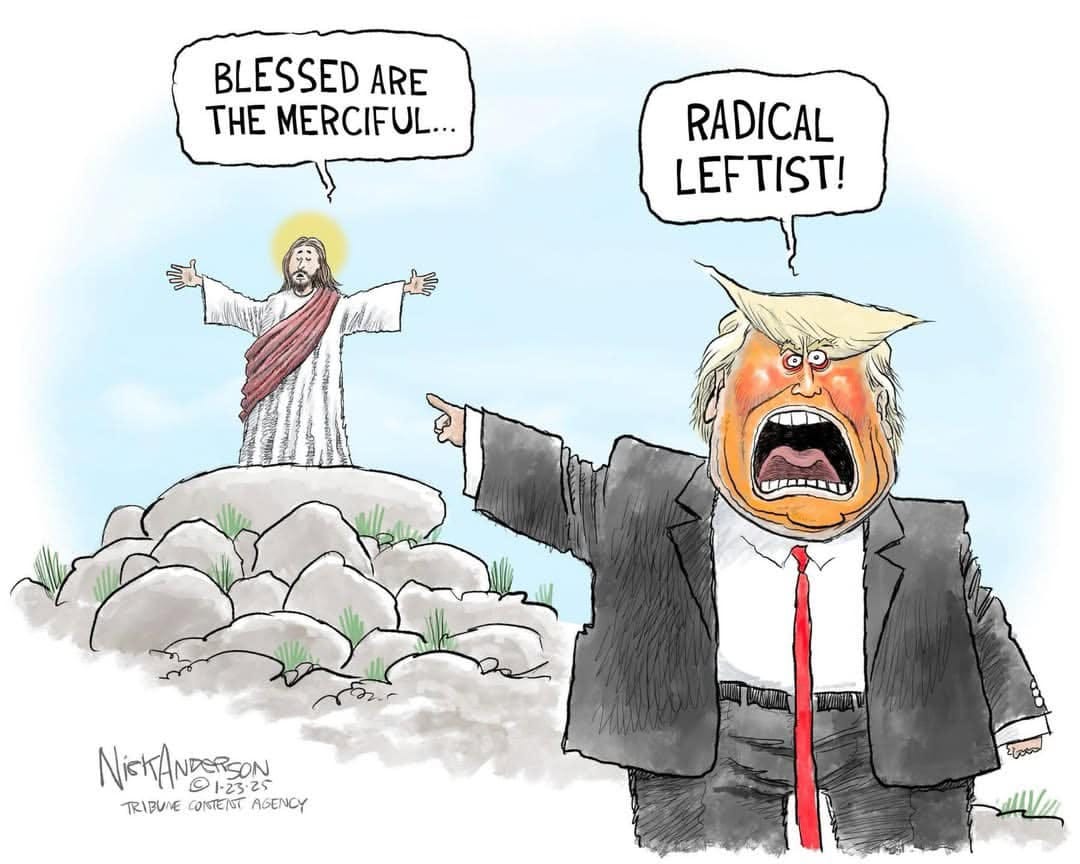Choosing Jesus is not the same as Choosing the Way of Jesus
On Bishop Budde, President Trump, and things falling apart
I have been wrestling with what to say, and I can’t say that this is profoundly insightful.
But this is really about choice. About agency. About being formed.
You have probably heard that, during part of the Presidential Inauguration, Bishop Mariann Edgar Budde asked President Trump to “have mercy upon the people in our country who are scared now.” And Trump later shot back that “the so-called Bishop who spoke at the National Prayer Service on Tuesday morning was a Radical Left hard line Trump hater.”
Then a firestorm began between two movements of people, two different camps formed in two different ways, both claiming the name of Jesus.
But both, to an extent, are distortions of what being formed in Christ really is.
So I want to talk about these two formational paths.
I want to talk to you about why choosing Jesus is not the same as choosing the way of Jesus.
On Choosing Jesus, but Not His Way (or Faith without Love)
The political appropriation of “Jesus”, “Christ”, and “Christian” has always been a problem in modern America—a problem that goes back to the Protestant Reformation and its close ties to the princes and kings of those new things called “nations” (1517 AD), and back further to the Holy Roman Empire, which goes back to the first Christian Emperor of Rome, Constantine (312 AD).
But the tide of speculation regarding the conservative political use and abuse of “Jesus” began to swell after Trump’s first nomination and peaked with his second election, with now non-stop concern about Christian Nationalism and religious fascism. There is a near-endless stream of content calling out the abuses of so-called “Christian” politicians and leaders who seem more interested in scoring points in culture war politics than getting to know Jesus and his way.
And the critics of the “Christian-seemingly-in-name-only-politicians” have a point. Not only do some conservative “Christian” leaders seem not to try to connect the dots between their faith in Jesus and the love of Jesus, but they ridicule those who do.
This comic isn’t too far off as far as the rhetoric goes.
It is no wonder that many are leaving the church of their youth.
This is the formational path of choosing faith in Jesus in a cognitive way without walking the way of Jesus in love. This formational path is being taught implicitly and explicitly by many churches in the USA.
(See Myles Werntz who reminds us that the church is a transnational community that should probably hold looser its commitments to national territories.)
On Choosing the Way of Jesus, without Choosing Jesus (or Love without Faith)
The political appropriation of “Jesus” is not just a conservative thing. American civil religion has always been promoted through mainline Protestant churches. This is why Bishop Budde was preaching to the President during the Inauguration.
The Fundamentalist separation of over a hundred years ago was caused by “modernists” (what we might call the progressives today) revising faith to fit the rational categories of the Enlightenment (back when secularization and demythologizing were cool, but now we have to wonder if they aren’t privileged moves of high-class Westerner). These modernists asked whether Jesus really is God (in a unique sense), whether the Bible was really from God (in a revelatory sense), and whether Jesus’ death and resurrection really saved us (in a real ontological sense).
When you look under the hood and listen closely, while the same words are being used (love, mercy, salvation, faith), they mean very different things than historic Christianity (of course there is great variation from person to person and church to church). Theologian Roger Olson goes so far as to claim that Protestant Liberal theology is really a new religion, different from historical Christianity (https://a.co/d/5GZkaAy). Yes, I know this is an ironic statement as people are now claiming that the Christianity celebrating Trump should be called a new religion, of which I had something to say after Jan. 6th.
The reason so many conservatives were outraged is because the way of Jesus as love is being used rhetorically for a perceived liberal agenda without the person of Jesus—as God, Savior and Lord—being loved.
Sure, in these circles, Jesus is loved as an example, as an image, as the source of an idea, as the symbol of a struggle. But not loved so much in his person. Not worshipped. Not really prayed to as “our refuge and strength, a very present help in trouble” (Ps. 46:1).
This mainline liberal Protestantism is the formational path of choosing the loving way of Jesus without choosing Jesus in faith. This formational path is also being taught implicitly and explicitly by many churches in the USA.
(As Kaeley Triller Harms say, we must be wary emotional manipulation framed as kindness and love—abusers do that just as much as supposedly speaking truth to power).
The Charge to Choose!
Certainly, we could nuance all this over and over, deeper and deeper, with infinite qualifications and counter-examples.
But really, it does come down to choosing, of how we are being formed.
Conservatives often choose faith in Jesus, without following the way of Jesus.
Progressive often choose the way of Jesus, without the faith in Jesus.
So, to my progressive leaning and exevangelical friends.
You are right that in the Sermon on the Mount Jesus said that we will be judged according to the fruit (Matt. 7:15-20), that our actions matter, and that Jesus blessed the poor, those who mourn, and those who are merciful (Matt. 5:3-10)—not to mention something about peacemakers! You are right to emphasize the way of Jesus.
But remember that at the center of the Sermon on the Mount is a focus on prayer, a concrete prayer that focuses first on the glory of the Father’s name, and the militant idea of a kingdom, not to mention the giving up of one’s will. This isn’t a vague spirituality with a nebulous conception of God. It is a concrete and demanding practice that is to be seen by God alone, in secret, where you need to mean it. This prayer is a concrete, honest, and even vulnerable act of real faith—not faith in an idea, notion, model, symbol, or conception of God, but the faith in a God who actually is there, a faith witnessed in the wrestling we see in the Psalms.
We must choose Jesus—as a person who is the crucified Savior and Lord of all, who is personally interested in our lives, our calling, and yes, even our own personal holiness and personal sanctification, the person Jesus, who is fully God and fully human.
And before some say that Jesus just pointed to the Father, not himself, well, Jesus was pretty clear that access to the Father and membership in the Father’s family happened only through him (Matt. 10: 32-42). Indeed, no one can know the Father except through the Son (Jesus), for “no one knows the Father except the Son and those to whom the Son chooses to reveal him” (Matt. 11: 27). And when Jesus commented about the faith or lack of faith or the need to grow faith, it is Jesus who is the object of that faith, not primarily “God” as a concept.
To my conservative-fundamentalist friends.
You are right that faith in Jesus is central, that orthodoxy still matters, and the Bible is God’s word to us and for us, and we should take it seriously. You are right that we shouldn’t fit Jesus into systems of modern preferences and reasonableness.
But remember that the high and demanding call of Jesus to repent of our sins is not complete if we do not enter onto the way of Jesus, following him in our daily lives for the sake of others (see the Sermon on the Mount), which includes a clear concern for the poor, many times more than the greatness of a nation. If we can’t call those in power who claim the name of Jesus to at least have the cares and concerns of Jesus, if we can’t hold a conversation about how to be merciful, peaceful, and just, without descending into culture war antics, then we probably have lost the way of Jesus. And Jesus will judge you for it.
We must also choose the way of Jesus—a way that seeks to love all, in a concrete manner, not a version watered down through vague concepts of politics, nationality, and trickle-down economics.
The way of Jesus demands that the personal become social and political, that holiness and sanctification are not just ends, but also the means, and should not be so quickly discarded for political gain.
Choosing Jesus and His Way
I know for those on the left it seems terribly old-fashioned, but I still think each one of us needs a personal relationship with Jesus. That is the life of faith.
And I know for those on the right it seems terribly radical, but I still think each one individually—and all of us together—need “to do justice, and to love kindness, and to walk humbly with your God” (Micah 6:8), and prove our faith by “looking after orphans and widows in their distress” (James 1:27) without qualification.
Let us choose Jesus and his way.
Let us be formed into Christ for the sake of the world.







Very clear mapping and landed on a succinct and diagnostically insightful assessment:
1) Liberal Protestantism is the formational path of choosing the loving way of Jesus without choosing Jesus in faith
2) Conservative Evangelicals: This is the formational path of choosing faith in Jesus in a cognitive way without walking the way of Jesus in love. This formational path is being taught implicitly and explicitly by many churches in the USA.
A recapitulation of the past, as you note. Why does intimacy with Christ devolve into inaction, and why does social justice devolve into loss of intimacy with Christ?
I wonder:
* What do you see happening with Catholicism, becoming publicly resurgent alongside this
* What about ecclesiology? The growing number of Evaneglcaisl non-attenders leaning into Christian nationalism for their tribal identity? Those ex-evangelicals, with identity around having left the church and espousing social justice but not doing that with any church community, liberal or otherwise. Are these mutations of the recaputliation by other cultural forces, of social media, consumerism and identity politics?
So very helpful, thank you